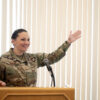Minnesota National Guard fills gap amidst COVID-19 pandemic surge
January 13, 2022 (COTTAGE GROVE, Minnesota) —
New Minnesota National Guard COVID-19 community-based testing sites have recently opened in Cottage Grove, Anoka, and North Branch.
There are approximately 200 service members supporting COVID-19 testing sites at nine locations across the state. Since November 2021, the Minnesota National Guard has assisted in testing more than 105,000 Minnesotans.
“We are happy to do it,” said Master Sgt. John Vavra, the noncommissioned officer in charge of the testing sites. “It’s been a very good group of soldiers so far.”
Since the pandemic’s beginning, the Minnesota National Guard has been on the frontlines in responding to the crisis. Service members have worked hard at various testing sites, vaccination sites, and long-term care facilities.
Recently, more than 500 personnel trained with 16 state colleges to become Certified Nursing Assistants (CNA) so they could bridge the gap as healthcare staffing shortages grow due to the pandemic.
“Those that are doing this come from all walks of life,” said Minnesota Gov. Tim Walz, during a visit to a Maplewood alternative care site, Jan. 4, 2022. “We’ve got pilots here, soil scientists, we’ve got full-time technicians, we have a plethora of skillsets, but to train to be a CNA, to put your own family on hold, and to come here and serve is the epitome of that selfless service we talk about.”
Airmen and Soldiers are also currently serving at 10 long-term care facilities.
The Minnesota National Guard is not alone in stepping up to the challenge of responding to the pandemic. According to the National Conference of State Legislatures’, Governors in all 50 states, the District of Columbia, Puerto Rico, Guam and the U.S. Virgin Islands have activated components of their National Guard forces to assist with the response to the pandemic.
Surrounding states have had a similar response to the pandemic. In Wisconsin for example, National Guard members were activated in March 2020. In 2021, their mission focused on COVID-19 testing and distribution of vaccines. In the fall, Wisconsin National Guard members began training as temporary and certified nursing assistants.
“We have the most expansive use of the Guard in this model. It appears that every other state, now with [the Omicron variant of COVID 19], is hustling to get there,” said Walz. “They are picking up this model and starting to train.”
Minnesota’s Task Force COVID began in March of 2020 when Walz signed Executive Order 20-13, authorizing the Minnesota National Guard to assist with the COVID-19 response. The Guard provided personal protective equipment from its medical warehouse at Camp Ripley to first responders across the state.
Partnered with the Minnesota Department of Health and the Army Corps of Engineers, the Guard also assisted in identifying and selecting alternate care sites.
In May 2020, the Minnesota National Guard began supporting COVID-19 testing in Minnesota’s long-term care facilities. Six armories were opened for testing making 45 sites across the state. Throughout the remainder of the year, Minnesota’s Airmen and Soldiers continued to operate these sites, supporting both nasal swab and saliva testing.
“The Guard has been asked to do a lot, and they are still continuing to do it,” added Walz. “They are doing it with professionalism, and they are doing it with care.”
Near the end of 2020, the Minnesota National Guard activated service members for the first time to fill staffing gaps in long-term care facilities throughout the state. 120 medical personnel conducted nasal testing in 280 long-term care facilities for more than 72,000 residents and staff. 413 nonmedical service members received training at various locations throughout the state, allowing the Minnesota National Guard to assist approximately 30 long-term care facilities experiencing healthcare staffing shortages.
In 2021 the Minnesota National Guard supported the State of Minnesota and the Department of Health by assisting at ten community vaccination sites and transporting vaccines to communities outside the metro area. In the fall, service members began administering COVID-19 tests at seven additional community-based testing sites throughout the state.
“The Minnesota National Guard’s success is a result of the professional women and men who serve our organization,” said Col. Scott Rohweder, Minnesota National Guard’s director of operations. “Additionally, our interagency and educational partners made it possible to quickly respond to requests for COVID-19 missions. These relationships at home were the foundation for planning and performing duties associated with COVID-19 community-based testing and vaccination sites, and support to long-term care facilities.”
Story by Army Sgt. Mashima Alkamooneh



